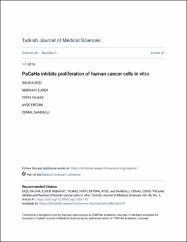PaCaHa inhibits proliferation of human cancer cells in vitro
Künye
Ekşi, S., Ejder, N., Yilmaz, F., Ertürk, A., & Sandalli, C. (2016). PaCaHa inhibits proliferation of human cancer cells in vitro. Turkish journal of medical sciences, 46(3), 872–876. https://doi.org/10.3906/sag-1503-142Özet
Background/aim: The aim of this study was to investigate the antiproliferative and cytotoxic effects of a newly synthesized molecule named paracetamol acetohydroxamic acid (PaCaHa) on human neoplastic cell lines. Materials and methods: A549, CRL 2923, HeLa, and ARPE were treated with various concentrations of PaCaHa and DMSO (vehicle control). The cytotoxic/cytostatic effects of PaCaHa were determined after a 24-h incubation period and compared to the DMSO control. The cytotoxic and antiproliferative effects were determined by the trypan blue dye exclusion and MTT methods. Results: A higher susceptibility to PaCaHA was found in CRL 2923 and HeLa cells, while A549 and ARPE cells were less responsive to PaCaHa. The percent of cytotoxicity resulting from 400 µg/mL of PaCaHa were >90 for CRL-2923 and HeLa, 68 for A549, and 64 for ARPE cells. The cytotoxic difference between CRL-2923/HeLa and ARPE/A549 cells was significant (P < 0.05). Conclusion: PaCaHa showed dose dependent cytotoxic and antiproliferative effects on three distinct human cancer cell lines. The differential effect of PaCaHa on different cancer cell lines suggests that PaCaHa could have a potential antitumor effect on specific cancer types. These results support further comprehensive studies on PaCaHa and its derivatives.


















